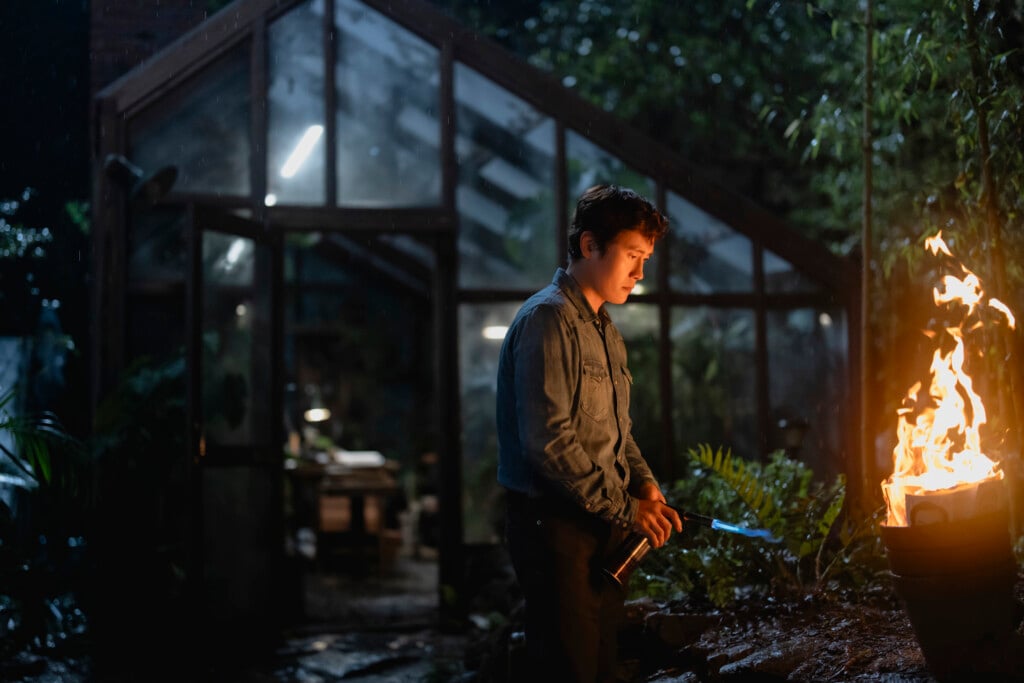The Held-Up Heist
At various times over the past decade, David Fincher, Sam Mendes and Michael Mann were slated to direct Scott Frank’s screenplay for The Lookout, about a brain-damaged high school hockey stud who gets smooth-talked by distant acquaintances into robbing a small-town bank. That Frank — best known for straightening and sharpening the tangled lines of Elmore Leonard’s novels Get Shorty and Out of Sight — wound up directing The Lookout himself was the best thing that could have happened to his script. After all, it’s a story about how we tell ourselves stories to retain a tenuous grasp on sanity. Who better to guide us through it than a man obsessed with the process of tale-telling itself?
In truth, The Lookout is a rather straightforward narrative. A cocky kid is brought low by a horrific accident that leaves him a shell of his former self. He spends years wrestling with pain and guilt but can make no headway, thanks to the fact that his head’s in the way — he can remember everything but can keep nothing straight, not even his morning routine or where he keeps the can opener. His blind roommate (a bearded, heavy Jeff Daniels) convinces him to treat his life as a short story, to write everything down in his notepad and to always begin at the end. “Can’t tell a story if you don’t know where it’s going,” says the roommate turned sage.
Frank, however, begins at the beginning, with Chris Pratt (Joseph Gordon-Levitt) driving a convertible sports car with his stunning blond girlfriend and another giggling couple. Chris kills the headlights, to woo and wow his girl with a sky full of fireflies. They laugh, sounding like every other high school jock and homecoming queen who believe themselves immortal — till their giggles are interrupted by the sound of crunching metal and shattering glass.
Years pass, and when next we see Chris he’s in therapy, trying to piece together the fragments of his battered brain. He can’t recall what he’s done that very day. He has a dead-end job sweeping up a small-town bank after hours. In short, he’s trapped — by his guilt, by his injury, by the father (Bruce McGill) who gives him just enough dough to pay rent.
Which is why Chris, the least likely candidate for a bank heist, bites when a guy from high school named Gary (Matthew Goode) baits the hook. “Whoever has the money has the power,” Gary tells him. “Don’t you want your old life back?” Gary dangles extra incentive: Luvlee Lemons (Isla Fisher), a former stripper who, like Gary, was ahead of Chris in school but nonetheless in awe of him way back when. All they ask of Chris is that, on the night of the heist, he act as the lookout.
There are moments when The Lookout feels like an early screenplay from a veteran writer; it has a few plot holes (involving a security system and a character who simply vanishes with no explanation). But when considered as a whole, The Lookout works. It takes its time, saves its breath, lets us know these people before putting guns in their hands and tossing them in a tiny bank vault on a winter night. Frank likes his story, but he loves his characters.
Gordon-Levitt, who was only beginning his stint on Third Rock From the Sun when Frank wrote the script, was last seen in Rian Johnson’s solid gumshoe picture Brick. The Lookout is sort of Brick‘s flip side — noir filled with silences, a movie in which the hero is always this close to playing the patsy. As Chris, Gordon-Levitt is worth the admission all by his lonesome. He’s that good — the proverbial young man with an old soul who brings unexpected depth, complexity and sincerity to what could have been just another damaged-guy role. He’s the one to look out for.




